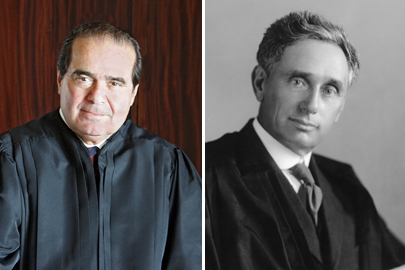Justices Scalia and Brandeis: History repeats itself (sort of)
One hundred years ago, Washington became embroiled in one of the biggest struggles over a Supreme Court justice in American history. What can it tell us about what's going on today?

A Supreme Court justice suddenly dies in a presidential election year.
The President, a Democrat, wants to nominate a liberal, but faces unyielding opposition from conservatives in the Senate. The battle between the President and Senate promises to be among the most epic over a Supreme Court nominee.
Welcome to 1916. What happened when President Woodrow Wilson nominated Louis D. Brandeis to the Supreme Court 100 years ago bears a striking resemblance to the struggle over Justice Antonin Scalia’s replacement. History is not repeating itself exactly, but it’s coming close enough to be instructive.
“There are definitely some intriguing parallels,” says Daniel Breen, a lecturer in legal studies. The school this year is celebrating the centenary of his confirmation to the Supreme Court.
This semester, Breen is teaching the only undergraduate course in America focused entirely on the famed jurist.
Wilson officially nominated Brandeis a few weeks after the death of Joseph Rucker Lamar, a Democrat from Georgia who tended to vote pro-business. On the other hand, Brandeis was known as the “people’s lawyer” for his crusades against large corporations and monopolies and his support for progressive causes.
Conservative Republicans opposed Brandeis fiercely. They saw him as a radical who threatened the interests of Wall Street. William Howard Taft, the former president and a Republican, called Brandeis “a man of infinite cunning,” capable of using “much power for evil.”
A century ago Supreme Court nomination hearings tended to be short and simple. But in Brandeis’ case, the Senate took the unprecedented step of forming an official subcommittee to investigate the nominee. It was at the time the most contentious Supreme Court nomination battle in American history. It was also the longest lasting, 125 days from when Wilson first put Brandeis’ name before the Senate until the Senate confirmed him. That record still stands today.
In the end, the Senate voted 47 to 22 in favor of Brandeis with 21 Republicans and one Democrat opposing. Wilson succeeded using the same approach President Obama may have to use. He appealed to Republicans of a more moderate bent. “Wilson drove a wedge between progressive and conservative Republicans,” Breen says. “The question is whether Obama can accomplish something similar.”
There were also significant differences between now and then. Wilson’s own party had a majority in the Senate whereas it’s currently in the hands of the president’s opposition. In addition, Breen says there were more moderate Republicans to appeal to then. Several were progressives themselves, more open to Brandeis’ positions. Finally, Brandeis faced opposition not just because of his political views, but also because, as a Jew, he had to deal with anti-Semitism, even if it was never overtly expressed during the hearings.
Categories: Humanities and Social Sciences





